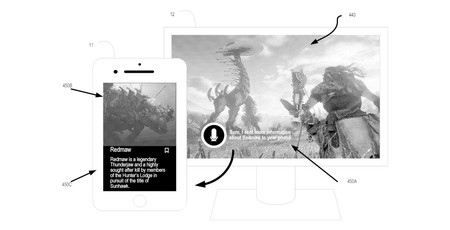
Sony has patented a voice assistant which can run on a connected smartphone or tablet and help players out in-game on PlayStation consoles, under the working title PlayStation Assist.
The idea of tying together voice-activated assistant technology and console gaming isn't new: Microsoft launched its Xbox One console family with a bundled Kinect camera system, the microphones of which could be used to pick up voice commands for everything from in-game actions to taking a screenshot or powering the system off; while the Kinect sensor was removed from the console bundles in a pricing war with rival Sony, the company recently partnered with Google to allow Google's Assistant to control Xbox One consoles in a similar fashion. Ubisoft, meanwhile, launched its artificially-intelligent assistant Sam in January 2018 with the promise it would deliver 'tailored tips and information' based on 'players' profile information, game library, friends list, community, and Ubisoft services.'
Sony's vision, however, goes a stage further than its rivals. In a patent first spotted by Niko Partners senior analyst Daniel Ahmad and publicised via Twitter, the company has filed a patent for what it describes as a 'voice help system using artificial intelligence' and refers to as 'PlayStation Assist.'
'With higher processing power video games are becoming more complex and expansive. However with the increased complexity, users may find it increasingly difficult to navigate through and/or complete the video game. For example, video games may become more expansive and include millions and even trillions of available options available to users,' Sony's patent explains. 'As such, a user could not possibly even try each of those available options, or even understand which of those options are available. In other cases, a user may reach a point in a video game that is seemingly impossible to navigate through or solve. For users, this occurs quite frequently where the user increasingly becomes frustrated with a game due to its difficulty or an inability to advance through the game and eventually ends up quitting the video game. For instance, in the game play of a video game the user may be trying to pass through an obvious gateway to reach another part of the gaming world in order to advance the game play.
'To illustrate, a user may need to go through a waterfall acting as the gateway, and has seemingly exhausted all available options in trying to pass. However, even though a solution is available and simple if known (e.g., pick up stabilizing rock and run through the waterfall), for whatever reason the user is unable to find the correct path or sequence of operations to gain entry. After hours of futility, the user may end up quitting the game because the user can find no way to advance. It is in this context that embodiments of the disclosure arise.'
Sony's proposed solution: A smartphone app which responds to 'Hey, PlayStation' and parses natural-language queries about in-game activity before responding in the most appropriate manner - including modifying the game itself, such as marking the location of an objective or pick-up on the player's map. Demonstrated using Horizon Zero Dawn as a sample application, the system would provide anything from 'a heads-up display feature, a link to guides, a link to the history of queries and responses, and a link to messaging,' while responding to context-sensitive queries like 'how do I kill this dragon' appropriately with on-screen guides, strategies, and details on the enemy's weaknesses.
The existence of the patent, which was filed earlier this year and published late last week, does not mean that Sony is actively developing such an application - but it does suggest the company is at least considering it. The full patent, meanwhile, is available on the WIPO IP Portal.

MSI MPG Velox 100R Chassis Review
October 14 2021 | 15:04









Want to comment? Please log in.